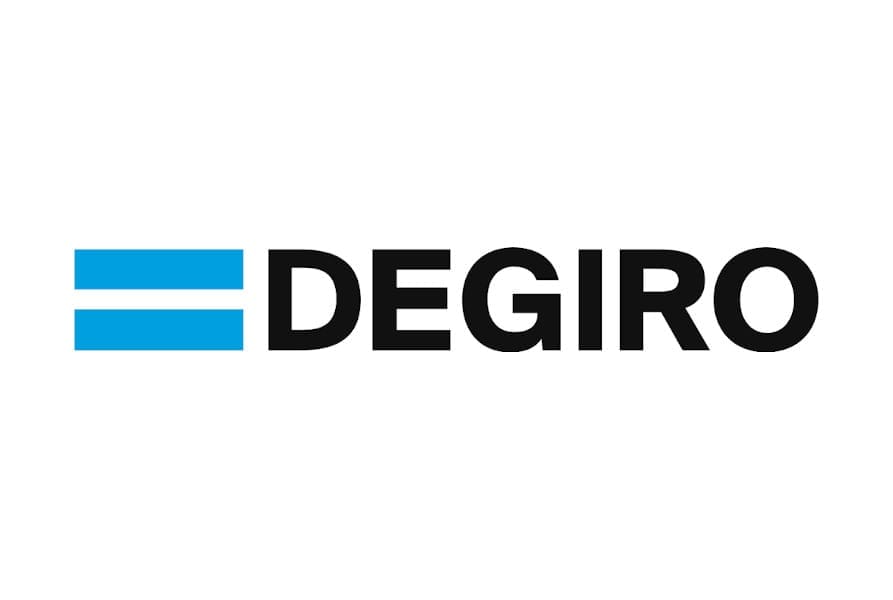DEGIRO review 2025
DEGIRO is a low-cost brokerage platform available to European and Swiss investors. The article takes a closer look at what it has to offer.

Financial institutions often give you access only to a pre-selected range of products. A key aspect of financial independence is having access to a broad market of securities with as little friction as possible. A brokerage account is an essential tool for this purpose and nowadays there are several options at your disposal. In this post, we take a closer look at one of them: DEGIRO.
- Introduction
- Regulatory considerations and risks
- Features
- Fees
- Practical examples
- Conclusion
- Opening a DEGIRO account
Introduction
DEGIRO is a Dutch brokerage company headquartered in Amsterdam. It launched retail services in the Netherlands in 2013, and now boasts a presence in 18 countries across the European continent, including Switzerland. Despite its European roots, it provides access to a wider global market, including North American (US, Canada), Asian (Hong Kong, Tokyo, Singapore), Australian and of course European and Swiss markets. DEGIRO is an execution-only broker and therefore does not offer financial advice. It operates on a pay-per-use fee model, so your costs are tied to the trades you place and markets you access.
DEGIRO positions itself as an entry-level to intermediate brokerage option, its fees are at the lower end compared to competitors, and the platform’s interface is fairly intuitive, though somewhat basic.
Regulatory considerations and risks
DEGIRO is not regulated by FINMA (the Swiss Financial Market Supervisory Authority). Swiss clients are allowed to open an account, but regulation and client protection fall under European regulatory authorities rather than Swiss law.
DEGIRO is the Dutch branch of flatexDEGIRO Bank AG, which is primarily supervised by the German financial regulator BaFin. In the Netherlands, the Dutch branch is registered with De Nederlandsche Bank (DNB) and supervised by both the DNB and the Netherlands Authority for the Financial Markets (AFM).
DEGIRO uses a separate legal entity (a special purpose vehicle, SPV) to hold the assets you purchase. The SPV’s sole function is to administer and safeguard the investments; by law, it does not engage in commercial activities. This separation means that if DEGIRO becomes insolvent, your securities held in the SPV are not part of DEGIRO’s assets and cannot be claimed by its creditors.
If, in the unlikely scenario, the SPV is also unable to return your assets, the German Investor Compensation Scheme compensates losses of non-returned assets up to 90%, with a cap of €20,000.
Non-invested cash (your uninvested money) is held in a cash account with flatexDEGIRO Bank AG. This cash is protected under the German Deposit Guarantee Scheme up to €100,000 per customer.
Features
User experience
DEGIRO offers both a desktop platform and a mobile app, available for iOS and Android. For added security, two-factor authentication (2FA) is recommended. Overall, the interface is fairly intuitive. The search function could use some improvements, particularly on mobile, but searching by ISIN generally makes it straightforward to locate available securities.
When opening a DEGIRO account, you must provide details of a personal bank account in your name. Once your bank account is linked to your DEGIRO account, all transfers must originate from that same account and be denominated in Swiss Francs in order to be credited. Deposits usually take one to two business days, though in rare cases, it might take longer. Withdrawals work similarly: once requested, funds are typically transferred back to your personal bank account within one to two business days.
Currently, it is not possible to fund your account using third-party payment platforms such as PayPal or Stripe.
Products
DEGIRO provides access to a solid range of asset classes, though its offering is weighted heavily toward stocks and ETFs. While this may not be obvious at first glance from the table below, it should be noted that a significant number of ETFs are domiciled in Ireland and therefore accessible to European investors. This makes the selection broader than it might initially appear.
| US | Europe | Switzerland | Canada | Australia | Hong Kong | Tokyo | Singapore | |
|---|---|---|---|---|---|---|---|---|
| Shares | x | x | x | x | x | x | x | x |
| ETF | x | |||||||
| Bonds | x | |||||||
| Options | x | x | ||||||
| Futures | x | x | ||||||
| Leverage | x |
That said, the US is also a major player in the ETF space, and the lack of access to some well-known US-based products is definitely a drawback in DEGIRO's offering. In most cases, this isn’t a deal breaker, since suitable alternatives usually exist, but it’s worth noting that certain popular US funds remain unavailable.
Direct access to individual bonds on DEGIRO is rather limited. However, for most private investors, bond exposure is typically achieved through bond ETFs, and DEGIRO offers decent coverage in that category.
Several of these asset classes are disabled by default. To enable them, you must complete a short questionnaire that assesses your knowledge and confirms that you understand the risks. The process is straightforward, and DEGIRO supplements it with educational resources.
I’ve only traded shares, ETFs, and bonds, so I can only speak for these three. In my own experience, the questionnaire is relatively simple, and if you need further clarification, DEGIRO’s knowledge base is a good place to start. If that does not suffice, a quick search on Google or ChatGPT can help close any knowledge gaps you might have.
Account types
DEGIRO currently offers several account profiles: Basic, Active, and Trader. For long-term investors with a buy-and-hold approach, the Basic profile is usually sufficient. If you want to trade on margin, short-sell securities, or trade derivatives, you’ll need to upgrade to Active or Trader. The upgrade is free, and you can downgrade back to Basic at any time by contacting customer support. The key difference between Active and Trader is the level of permitted risk exposure and leverage.
Securities lending
Several brokerage platforms lend out client-owned securities, typically to short sellers. The risks associated with securities lending are considered relatively low: DEGIRO requires collateral of at least 104% of the value of the loaned securities and imposes margin requirements to reduce counterparty risk. On some platforms, investors are compensated for this practice by receiving a fraction of the lending revenue. For long-term investors, this can be a way of generating an additional return on existing holdings.
Until 2022, DEGIRO offered a Custody account profile that allowed clients to opt out of securities lending. This option is no longer available, and all current account profiles allow it. However, unlike some competitors, DEGIRO does not share the associated revenue with its clients. It's unfortunate but understandable in a low-cost business model.
While the risks are minimal due to the collateral and safeguards in place, the absence of revenue-sharing is a drawback to consider, especially if you plan to invest significant amounts over the long term.
Fees
Fees are one of the most important factors to consider when selecting a broker. They are necessary to keep the platform running, but excessive fees can significantly reduce your returns. In the following sections, we outline DEGIRO’s fee structure and then provide practical examples to give you a clearer idea of what to expect.
Account fees
DEGIRO offers very competitive management fees for long-term investors. Currency conversion is handled automatically whenever you buy products that are not denominated in your home-country currency. Likewise, when you sell these products, the proceeds are automatically converted back into your primary currency. You can choose to disable automatic conversion and perform conversions manually, but in that case the cost is € 10 + 0.25%.
| cost | |
|---|---|
| Inactivity | € 0 |
| Deposit | € 0 |
| Withdrawal | € 0 |
| Custody | € 0 |
| Currency conversion | 0.25% |
Given the surcharge for manual conversions, this option is only worthwhile in specific situations. For example, imagine you are a Swiss investor holding a large position in a USD-denominated ETF and you wish to switch to another one. In the automatic conversion mode, selling your existing investment would convert it back to CHF, and then purchasing the new ETF would convert it again to USD, effectively paying the currency conversion fee twice. By switching to manual conversion mode, the proceeds from the sale remain in USD and can be used directly to purchase the new asset, avoiding any conversion.
Exchange connection fees
Whenever you purchase an ETF or company shares, an exchange acts as the intermediary; examples include NASDAQ, the New York Stock Exchange, the Swiss Stock Exchange, and Xetra, among others. On DEGIRO, you will pay a connection fee for each exchange you use, depending on where you buy your assets. The yearly cost is € 2.50 per exchange, excluding your home-country exchange. As a Swiss investor, if you only trade on the Swiss Stock Exchange, you do not pay this fee. In practice, however, the selection on a single exchange is often limited, so you may need to use multiple exchanges. It is therefore wise to try to limit yourself to a few key ones.
Handling fees
For every order you execute on an exchange, a flat € 1.00 handling fee is charged for all products and exchanges, except on Tradegate. A CHF 1.00 handling fee is charged on the Swiss Stock Exchange.
Stock fees
When purchasing stocks, a flat fee is applied, which varies depending on the exchange facilitating the trade. This fee is the same whether you buy a single share or ten thousand.
| Exchange | Fee |
|---|---|
| Swiss Stock Exchange | CHF 5.00 |
| NASDAQ | € 1.00 |
| NYSE | |
| NYSE Arca | |
| Toronto Stock Exchange (TSX) | |
| Toronto Venture Exchange (TSV) | |
| Canadian Securities Exchange (CSE) | |
| Athens Stock Exchange | € 3.90 |
| Bolsa de Madrid | |
| Budapest Stock Exchange4 | |
| Euronext Amsterdam | |
| Euronext Brussels | |
| Euronext Dublin | |
| Euronext Lisbon | |
| Euronext Milan | |
| Euronext Paris | |
| Istanbul Stock Exchange4 | |
| London Stock Exchange | |
| Nasdaq Copenhagen AB | |
| Nasdaq Helsinki AB | |
| Nasdaq Stockholm AB | |
| Oslo Borse | |
| Prague Stock Exchange | |
| Tradegate | |
| Vienna Stock Exchange | |
| Warsaw Stock Exchange | |
| XETRA | |
| Australian Stock Exchange | € 5.00 |
| Börse Frankfurt | |
| Hong Kong Stock Exchange | |
| Singapore Stock Exchange | |
| Tokyo Stock Exchange |
ETF fees
Similar to stocks, ETFs also incur a flat fee. DEGIRO maintains a list called the ETF Core Selection, as the name suggests, this is a selection of popular ETFs offered at more favorable rates. The list is subject to change without much notice. In the past, it included ETFs from exchanges beyond Tradegate, but this is no longer the case. In short, it’s worth checking the list at least once: if an ETF similar to the one you want is included, all the better. If not, whatever. Given the changing nature of this list, I personally wouldn't adjust my portfolio solely to chase this cost-saving.
| Product | Fee | |
|---|---|---|
| Tradegate | ETF Core Selection | € 0.00 |
| Other Exchages | ETF | € 2.00 |
Regarding ETFs, it’s important to note that this fee is not your only cost. Every ETF has an ongoing annual expense, typically expressed as an expense ratio, which is charged by the fund itself. This post on understanding fund fact-sheets can help you identify where to find it. On DEGIRO, the amount is automatically deducted from your account when the payment is due, so it’s important to maintain a positive cash balance to cover these charges. If your account does not have sufficient cash, DEGIRO may automatically sell some shares of the ETF to settle the payment, and you could incur additional surcharges.
Bond fees
As mentioned, DEGIRO’s selection of individual bonds is currently very limited. If your primary objective is investing in bonds, another broker might be more suitable. Regardless, like stocks and ETFs, bonds on DEGIRO also incur a flat fee.
| Exchange | Fee |
|---|---|
| Börse Frankfurt | € 2.00 |
| Euronext Amsterdam | |
| Euronext Brussels | |
| Euronext Lisbon | |
| Euronext Paris |
Practical examples
To give a better idea of the cost breakdown, a few examples will be presented.
As a Swiss investor you wish to purchase 10 shares of Novartis on the Swiss Stock Exchange.
- CHF 0.00 exchange connection fee (home-country exchange)
- € 1.00 handling fee
- CHF 5.00 stock-related flat fee for the Swiss Stock Exchange
- € 0.00 currency conversion fee (CHF-denominated)
As a Swiss investor, you wish to purchase 10 shares of Novartis on the NASDAQ exchange.
- € 2.50 exchange connection fee (once per year)
- € 1.00 handling fee
- € 1.00 stock related flat fee for the NASDAQ
- 0.25% currency conversion (CHF to USD)
As a German investor, you wish to purchase shares of an EUR-denominated ETF in the Core Selection list on the Tradegate Exchange
- € 0.00 no exchange connection fee (home-country exchange)
- € 1.00 handling fee
- € 0.00 Core Selection benefit on Tradegate
- € 0.00 currency conversion (EUR-denominated)
- Fund-specific ongoing expenses (see fund fact-sheet)
As a French investor, you wish to purchase shares of an EUR-denominated ETF in the Core Selection list on the Euronext Paris Exchange
- € 0.00 no exchange connection fee (home-country exchange)
- € 1.00 handling fee
- € 2.00 Core Selection but non-Tradegate
- € 0.00 currency conversion (EUR-denominated)
- Fund-specific ongoing expenses (see fund fact-sheet)
Conclusion
In summary, DEGIRO is a solid low-cost brokerage, particularly suitable for first-time and intermediate investors. The platform is easy to use, and the availability of stocks and ETFs is generally sufficient. The absence of account and, in particular, inactivity fees is advantageous for long-term savers who don't have the habit of trading regularly.
Costs for accessing and purchasing securities are reasonable, but some planning is required to manage them effectively. Keep in mind that these rules and fees are subject to change, so it is important to stay informed.
I have been using DEGIRO for several years. While it is neither the only broker I use nor the one I trade with most frequently, it is the platform I recommend to friends and family who are just starting to invest, due to its relative simplicity and broad offering.
Opening a DEGIRO account
If you intend to open an account, you can use SwissMisfortune's referral link.
If you wish not to, use this link instead.
Read next

Lump sum investing vs Dollar cost averaging
Lump-sum investing often outperforms dollar-cost averaging; however, DCA remains popular due to behavioral factors like loss aversion and regret.

Home-country bias
Overweighting your home country in investments may feel natural, but history shows diversification is key to managing risk and volatility.

Factor investing: the capital asset pricing model
The CAPM was the first framework that tried to explain how an asset’s risk affects expected returns and laid the foundation for factor investing.
 SwissMisfortune
SwissMisfortune